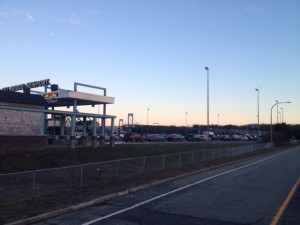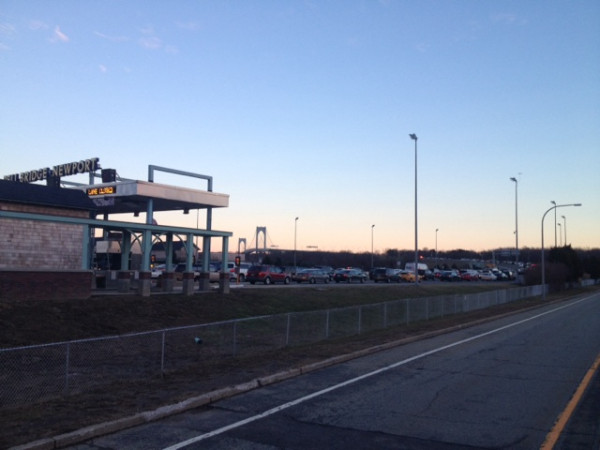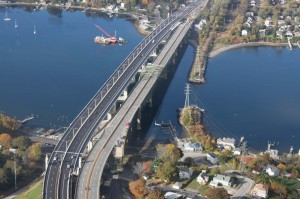
Several times in the course of Twitter conversations, C. Andrew Morse of Anchor Rising has challenged my claim that user fees (for example, tolls) are a conservative method of paying for a road. I challenged him to back that statement up.
Morse states his case this way:
-
1. Conservatives in general believe that public good provision is in the set of things that government should do well…
- Breaking public goods into individual transactions isn’t, in general, the best way to provide them…w/public good being used in its economic sense here, not to mean “anything that it might be good for the public to have”.
A staggering 400,000 people make the trip from New Jersey to New York each day by car, train, bus, and ferry, the most that commute between any two states. That exhausting journey gets messed up any time a choke point gets blocked (say, by a power problem in the Amtrak tunnel, or, in this case, the closing of several toll lanes in Fort Lee). For the typical Jersey commuter, it’s a rare week that passes without a glitch.
The ARC tunnel had been designed to relieve some of the enormous pressure on the few bridge and tunnel crossings between New York and New Jersey, where demand is expected to rise nearly 40 percent by 2030. The tunnel had bipartisan support from state lawmakers, and former Governor Jon Corzine, a Democrat, broke ground on the project in 2009 to much fanfare. Construction was already well underway on ARC, the biggest public works endeavor in the nation’s history, when Christie pulled the plug.
The federal government had committed to pay for 51 percent of the project, which had estimated costs in the neighborhood of $10 billion. Then-Secretary of the U.S. Department of Transportation, Ray LaHood, made a personal trip to New Jersey to plead with Christie to reconsider his stance.
But Christie stood firm, winning kudos from Republicans across the nation as a tough-minded conservative who was willing to make difficult choices about reining in government spending. It was his breakout appearance on the national scene, and a lot of people liked what they saw.
Two years after Christie killed ARC, a report from the nonpartisan Government Accountability Office came out that suggested what he had said about the cost of the tunnel was wrong. Among other things, the report found that he had dramatically overstated the share that New Jersey would have had to pay. Christie had claimed that the state would be responsible for 70 percent of the ARC costs, while the GAO found that number would have been 14.4 percent. The state ended up having to repay $95 million to the federal government in a negotiated settlement. (my emphases)
This is the kind of statement you see on left and right all the time: an accounting of costs that talks about “how much the state will pay” after the feds throw in their share, as if the federal part of the expenditure doesn’t matter. I fully agree that this was a project that was well worth its cost, but this is just bad accounting. The people of New Jersey are not just taxpayers in New Jersey. They also pay federal taxes. If a project is good on its own merits, then so be it. But if we’re arguing that it’s good because someone else is supposedly paying for it, we’re fooling ourselves (You can count on conservatives like John Kasich of Ohio to make the same type of ridiculous argument in defense of a project like the so-called Opportunity Corridor in Cleveland, so it’s a bipartisan disease).
If local and state governments thought about road projects in terms of the costs they carried, as well as the benefits, then the way we approached roads would be very different. Chuck Marohn of The Strong Towns blog makes this argument forcefully every week on his podcast. An engineer, Marohn was drawn to express himself on planning by what he observed on the job. He found that time and again, cities and towns allowed sprawl to be built for the benefit of the jobs, tax revenue, or outside grants that it would draw in its first iteration, without considering the long-term cost of maintaining the expensive infrastructure when it wore out. By building towns on large lots, one story high, with wide expanses of road, plumbing, and electrical connections connecting them at a distance, Marohn argues that the fantastic appearance of growth belies the fact that there isn’t enough revenue to cover long term costs. This has obvious importance to progressives concerned about land use policy and “alternative” transportation, but it’s fundamentally an example of where the basic mechanism of the market has been distorted by outside government interference.
Road pricing can be used to sustain the long-term costs of a project, like the Sekonnet Bridge, not only from a supply but a demand side. People’s peak demand for a “free” service is always higher than if they had to pay its costs. Jarrett Walker of Human Transit describes this as being like the people who sleep out in tents all night to get free tickets to a concert. The campers are paying in time what they might pay in money. This is what happens to people on a clogged road. The “free” (actually subsidized) use of the road has no check on people’s use of it, so that people pay in time during their commute for what they might have paid for in money.
Road pricing is only part of the externality of driving. Parking is among the most expensive aspects of a trip for most people, outweighing gas expenditures for the trips we make everyday (because so many of those–the commute to work, the trip to the grocery store, picking the kids up from soccer practice, are relatively short). We have a range of zoning requirements that force developers to create excess parking spots to meet a Christmas Eve peak demand, with the base assumption being that such parking spots are free (in reality, they average around $15,000 per space).
While making car users pay for the things they use, like road space or parking, has been portrayed by many so-called conservatives as “taxing”, in reality what is happening is that the users of a product do not pay for it at the point of consumption. Since most Americans drive to work, this might seem untroubling–after all, if we paid for these things up front, wouldn’t it mostly pan out the same way that it does if we did secretly through taxes? The error in this assumption is that the arrangement of our buildings, the distances we choose to travel, the methods we would use when we do travel, and so on are all static phenomena. The tragedy of the commons in this case is that the few people who try to break against the tide and ride a bicycle or take a bus someplace are left high and dry with no real infrastructure to support them, despite the fact that their way of getting somewhere is inherently more market-based and efficient.
What’s far more precious than a diamond is our ability to survive and thrive on this planet. But if we’re going to overcome the devastating effects of climate change, we need to address the market distortions in our transportation and land use.
It’s sound conservative policy.
~~~~


